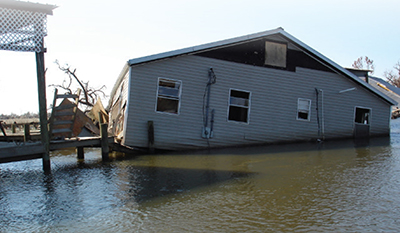
By Maya Richard-Craven
Imagine your house is surrounded by water. You sit on the roof waiting for help. All of your furniture, photo albums, and childhood keepsakes were washed away by a powerful hurricane. You wave your hands in the air hoping that someone will come. You are soaked in water and can barely see because it is so wet and windy. You see bodies float by your house. When the water reaches the roof, you realize no one is coming.
This was the reality for Black folks who couldn’t afford to leave during Hurricane Katrina.
On August 29, 2005, a city that was once a vibrant hub for entertainment, music, and tourism changed forever. New Orleans was hit with what started as a Category 3 hurricane, with wind speeds reaching up to 120 miles per hour. Hurricane Katrina, which eventually became a Category 5, killed an estimated 1,800 people and deeply impacted the Lower 9th Ward, an area in New Orleans that was 98.3% Black in 2000.
Experts say there’s a possibility this year could be one of the hottest in history. The World Meteorological Organization says there is a 90% chance that one of the next five years will be the hottest on record. Climate scientists say hurricanes will only worsen with climate change — and predictions for this year only show as many as four major hurricanes.
“This is not an issue that will go away,” says Olivier Pauluis, a professor of mathematics and atmosphere and ocean science at New York University. “Hurricane damages keep going up as we build more in at-risk areas.”
Climate change is “messing with weather patterns,” Pauluis says.
“This is not an issue that will go away.” –OLIVIER PAULUIS, NEW YORK UNIVERSITY
Cheryl Landry, a former resident of New Orleans’ West Bank knows first-hand how hot ocean temperatures can fuel a hurricane.
Landry was 50-years-old during Hurricane Katrina. She and her husband made the tough decision to stay in New Orleans for four days during the storm. At the time, she was a case manager at Lindy Boggs Hospital. She chose not to leave during the storm because of her patients and waited to be rescued at the hospital with her husband and other hospital staff.
“We could not save my patients. That was the hardest thing,” Landry says. “We lost all electricity and had no backup generators. They eventually passed away. My husband took the patients off the unit and took them to the morgue.”
“We could not save my patients. That was the hardest thing.”–CHERYL LANDRY, FORMER NEW ORLEANS RESIDENT
This year’s hurricane season started on June 1, which means another large hurricane could touch down at any moment.
The violent storms are started by a combination of warm, moist air and thunderstorms. When warm ocean air moves into a storm, it creates an area of low pressure below it. This results in more air rushing in. When the air rises and cools, clouds and thunderstorms form.
And, although Hurricane Katrina was one of the deadliest hurricanes in American history, there have been several hurricanes that devastated Black communities.
The History of Hurricanes in Black Communities
As of 2022, there were more than 300 hurricanes that directly hit the coastal United States since 1851. More than 80% of them hit Florida, Louisiana, and Texas. According to the National Weather Service Heritage Projects Editorial Staff, the Category 4 hurricane that hit Galveston, Texas, in 1900 was “the greatest natural disaster to ever strike the United States.” Galveston, the birthplace of Juneteenth, was rocked by major hurricanes in 1900 and 1915.
In more recent years, tropical storms like Hurricane Ida in August 2021 and Hurricane Ian in September 2022 impacted Black communities in Florida and Louisiana. These two Southern states are more prone to hurricanes because they are located on the coast. And in 2019, 56% of Black folks in the United States lived in the South.
We have a history of being affected by hurricanes, partially because so many of us reside in the South. And we face even more challenges when it comes to hurricanes due to racism in disaster recovery.
Disaster Relief and Recovery Run on Racism
Cities with large Black populations have experienced slower responses when it comes to disaster relief and recovery. The Federal Emergency Management Agency has received criticism for making Black folks wait out hurricanes before receiving any help or support. The lack of intervention during Hurricane Katrina brought the topic of racism in disaster relief to the forefront.
According to a September 2005 poll from the Pew Center for Research, 67% of Americans believed George Bush could have done more for relief efforts during Hurricane Katrina. In 2018, a study conducted by researchers from Rice University and the University of Pittsburgh assessed countries that each experienced $10 billion in hazard damage. The wealth of white survivors increased by $126,000 on average. But it wasn’t the same for Black survivors whose wealth took a hit and decreased by $27,000.
Sadly, many Black folks can’t afford to leave before climate-related disasters like hurricanes. This results in low-income Black people getting left behind to die. Not only are low-income folks forced to stay during hurricanes, but if they survive, they don’t have the resources to rebuild or start over. In Landry’s case, she and her family were able to move to Baltimore.
“We had to relocate,” she says. “All of sudden, you get uprooted and leave your job, leave your friends. I had to find another job. I had to remake myself.”
With climate change, Landry says Black people on the Gulf Coast should be prepared for the worst when it comes to hurricanes.
“Hurricanes are going to be stronger,” she says. “They’re going to be more intense. I think we’re going to have another Hurricane Katrina. It’s going to com


Be the first to comment